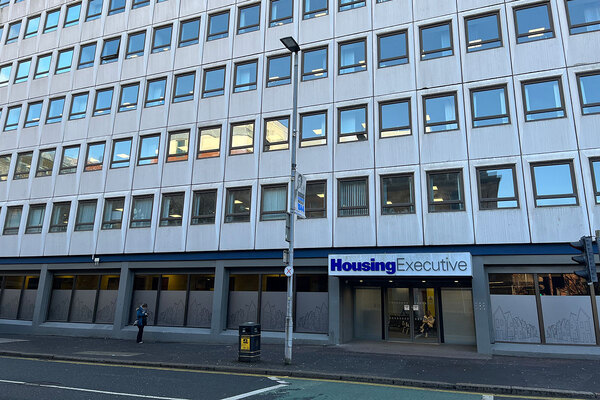You are viewing 1 of your 1 free articles
Nearly 80 organisations call on chancellor to extend homelessness funding over £1bn ‘cliff-edge’
A total of 76 homelessness organisations have signed a letter to the chancellor of the exchequer calling for an extension of £1bn of funding that is coming to an end next year.
The open letter, led by Homeless Link and addressed to Rachel Reeves, is signed by organisations including the National Housing Federation and the charity Crisis. It warns of a “perilous funding cliff-edge” facing homelessness services across the country, with almost £1bn due to leave the sector in April.
It calls for a one-year roll-over of existing homelessness funding in the Autumn Budget to provide financial certainty for the sector while a longer-term plan is put in place.
“We ask that you safeguard the sector in the Autumn Budget and commit to review spending on homelessness as part of the upcoming Spending Review,” they wrote.
It follows a recent open letter from 23 homelessness organisations, led by charity St Mungo’s, warning that frontline services for people sleeping rough could face cuts because of the looming “cliff edge” in vital funding.
The new letter points to rough sleeping rising by 27% in 2023 and 60% since 2021.
“If it keeps rising at the current rate, numbers in 2024 will be similar to the 2017 peak. Meanwhile over 150,000 children are currently trapped living in temporary accommodation, often in very poor conditions.
“Behind these statistics are people, let down by systems that should protect them, the insecurity and trauma of homelessness holding them back from achieving their potential,” the organisations said.
They said homelessness services “play a critical role” in supporting people to manage their well-being, engage with health and social care provisions, access training and employment opportunities, and “ultimately to live independent, fulfilled lives”.
“In recognition of the support provided and the overwhelming need across the homelessness system, through the 2021 Spending Review government has provided dedicated grant funds to deliver homelessness and rough-sleeping support services,” the letter states.
However, the current Spending Review period is coming to an end and the vast majority of funding commitments made to relieve homelessness are set to expire by April 2025.
Some of the funding set to end between now and April 2025 is the £548m Rough Sleeping Initiative, £435m Rough Sleeping Accommodation Programme and £13m Night Shelter Transformation Fund.
The total funding ending equates to almost £1bn due to leave the homelessness sector by the end of the financial year.
The organisations said that, without an extension, this would represent the “most significant setback in progress towards ending homelessness and rough sleeping in recent history”.
The inherent risks were “severe”, they wrote, and they were “already beginning to take effect”.
They include all forms of homelessness increasing, bed spaces being lost as services return rental contracts to landlords, and loss of skilled staff on a large scale.
A recent survey from St Martin-in-the-Fields, another charity, found that 64% of frontline workers feel their role has a negative impact on their well-being, while only 47% reported feeling secure in their job.
People with severe and multiple disadvantages were facing eviction from supported accommodation, triggering local authority statutory duties for some and pushing others into rough sleeping, the letter states.
This was all putting a “huge” strain on emergency services, the organisations wrote.
They are calling for a new ring-fenced funding system for homelessness.
The letter states: “While the sector must be given security in the short-term, there are deep flaws with the current system of homelessness funding.
“Current spending is inefficient and extremely complex, comprising a patchwork of different funding schemes.”
The government has committed to a cross-government strategy on homelessness, which the organisations said “needs to be backed by a cross-government funding approach”.
“It should be an urgent priority of the Treasury to launch a systematic, cross departmental review of all homelessness-related spending informing a commitment to develop and deliver a consolidated, ring-fenced homelessness funding system from 2026-27 onwards,” they wrote.
Rick Henderson, chief executive of Homeless Link, said: “The sheer number of organisations that signed this letter shows how much anxiety the funding cliff-edge is causing homelessness services across the country.
“Our members tell us that they are already considering redundancies and scaling back services.
“The Autumn Budget is the government’s final opportunity to give the sector some certainty and prevent the inevitable surge in homelessness that will come if services are forced to close their doors from March.”
He added: “In her recent speech at the Labour conference, the chancellor talked about recognising the benefits of investment.
“It must therefore be an important priority of the government to reshape this picture through delivering a ring-fenced homelessness funding system from 2026-27 onwards.
“This will give the homelessness sector the stability and funding to effectively prevent and end people’s homelessness, saving lives and reducing strain on health and emergency services in the process.”
A Ministry of Housing, Communities and Local Government spokesperson said: “We have inherited homelessness levels which are far too high and this is having a devastating impact on peoples’ lives.
“We are taking action by setting up a dedicated inter-ministerial group, chaired by the deputy prime minister, that brings together ministers from across government to develop a long-term strategy to get us back on track to end homelessness.
“Local authorities and their partners deliver vital work to tackle rough sleeping, and funding allocations will be set out following the Budget.”
Sign up for our homelessness bulletin
Already have an account? Click here to manage your newsletters












